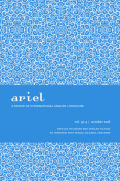Emailing/Skyping Africa: New Technologies and Communication Gaps in Contemporary African Women’s Fiction
Keywords:
African literatures, communication technology, cosmopolitanism, globalization, mobilityAbstract
Mobility marks the fields of contemporary African and African diasporic literatures in a profound way. In the study of postcolonial literatures, mobility is most often understood in terms of physical human travel that is embodied in the paradigmatized figure of the migrant. Yet, mobility is a concept whose meaning cannot be reduced to migrancy or physical travel in general. In the era of globalization, the world beyond the local becomes accessible through imaginative, virtual, and communicative forms of travel. The present article adopts a wider understanding of mobility by focusing on its communicative dimensions in its analysis of the ways in which Liss Kihindou, NoViolet Bulawayo, Véronique Tadjo, and Chimamanda Ngozi Adichie address it on the thematic and aesthetic axes in their novels. The recurring trope of communication gap attests that while the geographical distance caused by human travel can often be surmounted with the help of communication technologies, the relations between those who leave and those who stay behind are marked by a schism that translates into an emotional, epistemic and cultural distance that may be much harder to reconcile.


